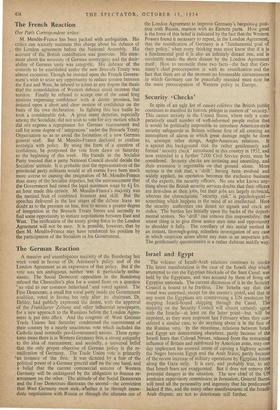Security 'Checks'
In spite of an ugly list of causes celebres the British publiq continues to manifest its historic phlegm in matters of ' security. This causes anxiety in the United States, where only a com- paratively small number of well-informed people realise that it would be politically impossible to introduce American-style security safeguards in Britain without first of all creating an atmosphere of alarm in which great damage might be done to, amongst other things, Anglo-American relations. It is against this background that the rather gentlemanly and formal ` security check' introduced in this country in 1952, and now extended to a further 7,000 Civil Service posts, must be considered. Security checks are irritating and unsettling, and their extension is regrettable on that ground alone. More serious is the risk that, a drill ' having been evolved and widely applied, its operation becomes the exclusive business of the experts, the security officers. No one who knoivs any- thing about the British security services doubts that their officers are first-class at their jobs, but their jobs are largely technical, whereas the characteristic ` security risk ' is psychological— something which happens in the mind of an intellectual. Hero the security authorities can detect no signals and crack no codes. The burden lies initially upon the backs of the depart- mental seniors. No ` drill ' can remove this responsibility; the wisest thing is to give those senior men time and opportunity to shoulder it fully. The corollary of this initial method is an instant, thorough-going, relentless investigation of any case in which suspicion arises about any man in an important job. The gentlemanly questionnaire is a rather dubious middle way.


































 Previous page
Previous page